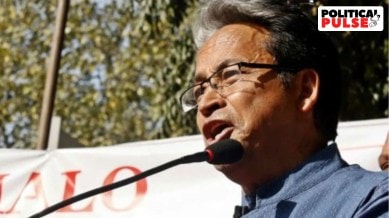Sonam Wangchuk: ‘This govt no longer has attitude of its last term… We trust it but are ready for most extreme steps’
Climate activist who is demanding Ladakh’s inclusion into the Sixth Schedule of the Constitution says, “The padyatra from Ladakh to Delhi showed how seriously people are taking the issue”

Climate activist Sonam Wangchuk, who has camped in Delhi demanding Ladakh to be included under the Sixth Schedule of the Constitution and a legislature for the Union Territory (UT), broke his 15-day fast on Tuesday after the Union Ministry of Home Affairs (MHA) called him for a meeting over his demands on December 3.
In an interview with The Indian Express, Wangchuk speaks about why the Sixth Schedule demand is legitimate, issues of the UT, and the road ahead, among other issues.
monthly limit of free stories.
with an Express account.
Excerpts:
*You broke your fast following assurances from the MHA over resumption of talks. What do you hope for in the negotiations?
We hope they will discuss including the UT in the Sixth Schedule (of the Constitution), providing Constitutional safeguards to (Ladakh’s) indigenous culture, environment, land, forest and customs.
I also hope there will be discussions on restoring democracy in Ladakh. As statehood will be soon restored in Jammu and Kashmir, Ladakh also deserves it. At least a legislature should be established.
For the past six years (since Article 370 was abrogated), youth in Ladakh have been unemployed while the UT is being run on district manpower and currently has a dysfunctional government. Half of the Rs 6,000 crore grant that comes in, goes back. We also hope there is a discussion on setting up a public service commission for Ladakh.
*What gives you hope, especially when all previous attempts have failed? A committee set up in 2021 also could not take off…
Though there is no assurance from the government, our trust is still there. This time talks are happening after a mass movement in a sensitive border area and they (the Centre) are able to see the deep engagement of the general public. The padyatra (from Ladakh to Delhi) showed how seriously people are taking the issue.
The government will come across as very very insensitive if it does not take notice of an issue, which involves national security, even now. You do not handle a border area, flanked by two hostile nations, in this way.
*In an informal meeting with leaders from Ladakh last year, Union Home Minister Amit Shah is learnt to have rejected the demand for inclusion in the Sixth Schedule. What makes you think the government will concede now?
That was another government which had that attitude. We want to believe this one is different. If not, we are ready to take the most extreme steps.
*What would those be?
We leave it to your imagination.
*Why do you think this government is different? It has the same leadership. Are you referring to the reduced mandate for Prime Minister Narendra Modi?
Yes. They have seen that people respond to how they act and may now become more responsible. In a democracy, people can make or break a government. In Ladakh, they lost a seat. We never wanted to damage them. We were happy that Ladakh was made a UT but unfortunately are now having to tread this path.
*If you were thankful, why the protests?
UT is like a body, a corpse, while democracy is its life. We always thought the UT would come with a democratic set-up like a legislature. Similarly, the Sixth Schedule is a form of democracy at the grassroots level for the indigenous tribes. The government had promised this to us many times. It was in their (the BJP’s) manifesto and also featured in the minutes of meetings of the Union Tribal Affairs Ministry. People were disappointed that they got a body without a soul.
*Is bureaucracy the problem? Are the people not being heard?
Yes, but I will not blame the bureaucrats. It is natural that bureaucracy without democracy becomes like that. Those at the helm have no accountability to the people.
*You claim that grazing rights of people are being denied due to corporate interests and Chinese incursions. There have been some positive developments on the India-China front. How do you see it?
Our Pashmina herders have problems on two fronts – Chinese incursions in the north and Indian corporates in the south. Work to take over pastures to set up huge solar power plants is already underway. If Ladakh was under the Sixth Schedule, they would not have done things according to their whims.
On the northern front, it is good news that negotiations are happening and there are indications of some positive results. But there is nothing to indicate that grazing rights are being restored. Our grazing areas have not gone into China but have moved into the buffer zone, which means the zone has moved further into India. Why does it not move towards China?
*Is the demand for inclusion into the Sixth Schedule negotiable?
While it is a perfect fit for Ladakh, it is up to our leaders in the Leh Apex Council and the Kargil Democratic Association to hold a dialogue with the MHA over the issue. In my personal opinion, an alternative with identical safeguards which is based on indigenous identity of the local population is also good.